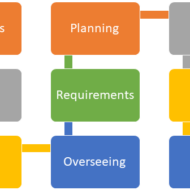Posted by Managementguru in Operations Management, Project Management
on Feb 24th, 2014 | 0 comments

Significance of Operations Management: Business firms need to formulate brilliant operations strategies in order to survive in the market for long. Focus on finance and marketing alone is not sufficient to compete in the global market. The emergence of innovative products and processes from leading companies in different parts of the world is a clear-cut evidence to prove the significance of operations function. Operations management is gaining importance, thanks to public awareness on quality and its applicability in service operations too. Advent of Industrial Revolution: Until the advent of machinery, each and every nation was dependent on agriculture, which was the prime economic activity. After the industrial revolution of the eighteenth century, mechanization in a large scale converted agricultural economy to an industrial economy. Slowly scientific principles were introduced into production activities to make it more systematic and thus “Production Management” evolved. Now service operations have also gained momentum and since the concepts and techniques of production management are applicable to service operations too, it is rightly called as “Operations Management.” Operations management functions at three different levels. Strategic levelTactical levelOperational level Strategic level: At the strategic level, the operations manager must have a long term vision, as to shape up the company’s success in the light of strategic decisions taken, with the approval of the top management. His area of concern would be, New product developmentNew process developmentProduct re-designProcess re-designProcess layoutProduct layoutFacility locationAggregate capacity planningPlanning co-ordination with finance and marketing departments Tactical level: At the tactical level, the operations manager is concerned about the planning and scheduling operations of the desired output. His area of concern would be: Designing a suitable inventory systemPlan for the work force and train them effectivelyQuality control systemMaintenance andReliability assurance system. Operational level: At the operational level, the job of the operations manager is to accomplish the “set targets”, by performing various coordinating and controlling functions. His area of concern would be: Ordering materials at the right timeScheduling productionScheduling workers as per production requirementControlling quality of goods and services producedFollow up of various schedules for proper implementationMaintaining and updating equipment and system reliabilityOn the job skill development of workers, etc. These functions are by no means exhaustive, but only indicative. The process of planning and control operations is not done in water tight compartments, but are interactive and integrative feeding on one another and also aligned in line with the overall corporate objectives. The strategies are evolved for the purpose of efficient utilization of the available resources as well as to predict the changes in the external business environment that calls for suitable action to limit their impact on the goals of the organization, in terms of cost, quality and...

Posted by Managementguru in Labor Management, Operations Management
on Feb 23rd, 2014 | 0 comments

What is Operations Management and Why is it Important? Operation is that part of as organization, which is concerned with the transformation of a range of inputs into the required output (services) having the requisite quality level. Management is the process, which combines and transforms various resources used in the operations subsystem of the organization into value added services in a controlled manner as per the policies of the organization. The set of inter-related management activities, which are involved in manufacturing certain products, is called as production management. If the same concept is extended to services management, then the corresponding set of management activities is called as operations management. What is Production? Production is defined as ‘the step-by-step conversion of one form of material into another form through chemical or mechanical process to create or enhance the utility of the product to the user’. Thus production is a value addition process. At each stage of processing, there will be value addition. Pic Courtesy: Minds.com Edwood Buffa defines production as ‘a process by which goods and services are created’. Some examples of production are: manufacturing custom-made products like, boilers with a specific capacity, constructing flats, some structural fabrication works for selected customers, etc., and manufacturing standardized products like, car, bus, motor cycle, radio, television, etc. Characteristics of a Production System 1. Production is an SYSTEMATIZED activity, so every production system has an objective. 2. The system transforms the various inputs to useful outputs. 3. It WORKS IN TANDEM with the other organisation systems. 4. There exists a feedback about the activities, which is essential to control and improve system performance. Evolution of Production Management Why Operations Management is Important? Increases productivity of every organization Leads to economic growth and development Helps employees to receive high wages Earns profit for a company Also plays a strategic role in a firm’s competitive success Want to Learn Some Interesting Operations Management Terms? Capacity planning—The process of determining the production capacity needed by an organization to meet changing demands for its products. Different types of capacity exist. For example, design capacity is the maximum amount of work that an organization is capable of completing in a given period; effective capacity is the maximum amount of work that an organization is capable of completing in a given period due to constraints such as quality problems, delays, and material management. Efficiency—Performing activities at the lowest possible cost. Enterprise resource planning (ERP)—Large, sophisticated software systems used for identifying and planning the enterprise-wide resources needed to coordinate all activities involved in producing and delivering products. Forecasting—The process of predicting future events, including product demand. Just-in-time—A philosophy designed to achieve high-volume production through elimination of waste and continuous improvement. Lean systems—Sometimes synonymous with just-in-time, it is a philosophy that takes a total system approach to creating efficient operations through the elimination of waste. Location analysis—Identifying the best location for facilities. Mass customization—The ability of a firm to highly customize its goods and services at high volumes through its operations management function. Product design—The process of deciding on the unique and specific features of a product. Process selection—The process of identifying the unique features of the production process that will give the product its unique characteristics. Process selection typically goes hand in hand with product design, as we need to create a process that gives rise to the particular product design desired. An excellent product design is worthless if a process for its creation cannot be developed. Productivity—A measure of how efficiently an organization converts inputs into outputs. It is usually measured by a ratio of output divided by input. Productivity is essentially a scorecard of how efficiently resources are used and a measure of...




